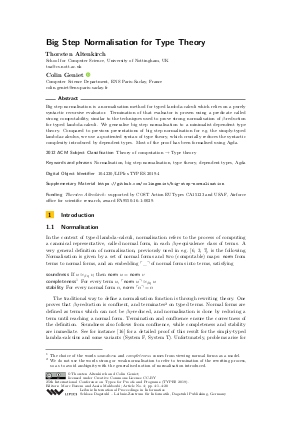Big Step Normalisation for Type Theory
Authors
Thorsten Altenkirch,
Colin Geniet 
-
Part of:
Volume:
25th International Conference on Types for Proofs and Programs (TYPES 2019)
Part of: Series: Leibniz International Proceedings in Informatics (LIPIcs)
Part of: Conference: International Conference on Types for Proofs and Programs (TYPES) - License:
 Creative Commons Attribution 3.0 Unported license
Creative Commons Attribution 3.0 Unported license
- Publication Date: 2020-09-24
File

PDF
LIPIcs.TYPES.2019.4.pdf
- Filesize: 478 kB
- 20 pages
Document Identifiers
Subject Classification
ACM Subject Classification
- Theory of computation → Type theory
Keywords
- Normalisation
- big step normalisation
- type theory
- dependent types
- Agda
Metrics
- Access Statistics
-
Total Accesses (updated on a weekly basis)
0Document
0Metadata
Abstract
Big step normalisation is a normalisation method for typed lambda-calculi which relies on a purely syntactic recursive evaluator. Termination of that evaluator is proven using a predicate called strong computability, similar to the techniques used to prove strong normalisation of β-reduction for typed lambda-calculi. We generalise big step normalisation to a minimalist dependent type theory. Compared to previous presentations of big step normalisation for e.g. the simply-typed lambda-calculus, we use a quotiented syntax of type theory, which crucially reduces the syntactic complexity introduced by dependent types. Most of the proof has been formalised using Agda.
Cite As Get BibTex
Thorsten Altenkirch and Colin Geniet. Big Step Normalisation for Type Theory. In 25th International Conference on Types for Proofs and Programs (TYPES 2019). Leibniz International Proceedings in Informatics (LIPIcs), Volume 175, pp. 4:1-4:20, Schloss Dagstuhl – Leibniz-Zentrum für Informatik (2020)
https://doi.org/10.4230/LIPIcs.TYPES.2019.4
BibTex
@InProceedings{altenkirch_et_al:LIPIcs.TYPES.2019.4,
author = {Altenkirch, Thorsten and Geniet, Colin},
title = {{Big Step Normalisation for Type Theory}},
booktitle = {25th International Conference on Types for Proofs and Programs (TYPES 2019)},
pages = {4:1--4:20},
series = {Leibniz International Proceedings in Informatics (LIPIcs)},
ISBN = {978-3-95977-158-0},
ISSN = {1868-8969},
year = {2020},
volume = {175},
editor = {Bezem, Marc and Mahboubi, Assia},
publisher = {Schloss Dagstuhl -- Leibniz-Zentrum f{\"u}r Informatik},
address = {Dagstuhl, Germany},
URL = {https://drops.dagstuhl.de/entities/document/10.4230/LIPIcs.TYPES.2019.4},
URN = {urn:nbn:de:0030-drops-130682},
doi = {10.4230/LIPIcs.TYPES.2019.4},
annote = {Keywords: Normalisation, big step normalisation, type theory, dependent types, Agda}
}
Author Details
Funding
- Altenkirch, Thorsten: supported by COST Action EUTypes CA15123 and USAF, Airforce office for scientific research, award FA9550-16-1-0029.
Supplementary Materials
References
-
Thorsten Altenkirch, Paolo Capriotti, Gabe Dijkstra, Nicolai Kraus, and Fredrik Nordvall Forsberg. Quotient inductive-inductive types. In International Conference on Foundations of Software Science and Computation Structures, pages 293-310. Springer, Cham, 2018.

-
Thorsten Altenkirch and James Chapman. Tait in one big step. In MSFP@ MPC, 2006.

-
Thorsten Altenkirch and James Chapman. Big-step normalisation. Journal of Functional Programming, 19(3-4):311-333, 2009.

-
Thorsten Altenkirch, Peter Dybjer, Martin Hofmann, and Phil Scott. Normalization by evaluation for typed lambda calculus with coproducts. In Proceedings 16th Annual IEEE Symposium on Logic in Computer Science, pages 303-310. IEEE, 2001.

- Thorsten Altenkirch and Colin Geniet. Agda formalisation for the paper big step normalisation for type theory. Available at https://github.com/colingeniet/big-step-normalisation, 2019.
-
Thorsten Altenkirch, Martin Hofmann, and Thomas Streicher. Categorical reconstruction of a reduction free normalization proof. In International Conference on Category Theory and Computer Science, pages 182-199. Springer, 1995.

-
Thorsten Altenkirch and Ambrus Kaposi. Normalisation by evaluation for dependent types. In 1st conference on Foundational Structures in Computation and Deduction (FSCD), 2016.

-
Thorsten Altenkirch and Ambrus Kaposi. Type theory in type theory using quotient inductive types. ACM SIGPLAN Notices, 51(1):18-29, 2016.

-
Ulrich Berger and Helmut Schwichtenberg. An inverse of the evaluation functional for typed lambda-calculus. In [1991] Proceedings Sixth Annual IEEE Symposium on Logic in Computer Science, pages 203-211. IEEE, 1991.

-
James Chapman. Type theory should eat itself. Electronic Notes in Theoretical Computer Science, 228:21-36, 2009.

- Cyril Cohen, Thierry Coquand, Simon Huber, and Anders Mörtberg. Cubical type theory: a constructive interpretation of the univalence axiom. arXiv preprint, 2016. URL: http://arxiv.org/abs/1611.02108.
-
Thierry Coquand. An algorithm for testing conversion in type theory. Logical frameworks, 1:255-279, 1991.

-
Gabe Dijkstra. Quotient inductive-inductive definitions. PhD thesis, University of Nottingham, 2017.

-
Daniel J Dougherty and Ramesh Subrahmanyam. Equality between functionals in the presence of coproducts. In Proceedings of Tenth Annual IEEE Symposium on Logic in Computer Science, pages 282-291. IEEE, 1995.

-
Peter Dybjer. Internal type theory. In International Workshop on Types for Proofs and Programs, pages 120-134. Springer, 1995.

-
Jean-Yves Girard, Paul Taylor, and Yves Lafont. Proofs and types, volume 7. Cambridge university press Cambridge, 1989.

-
Michael Hedberg. A coherence theorem for martin-löf’s type theory. Journal of Functional Programming, 8(4):413-436, 1998.

-
Martin Hofmann. Syntax and semantics of dependent types. In Extensional Constructs in Intensional Type Theory, pages 13-54. Springer, 1997.

-
Jean-Pierre Jouannaud and Albert Rubio. Rewrite orderings for higher-order terms in η-long β-normal form and the recursive path ordering. Theoretical Computer Science, 208(1-2):33-58, 1998.

-
Ambrus Kaposi, András Kovács, and Thorsten Altenkirch. Constructing quotient inductive-inductive types. Proceedings of the ACM on Programming Languages, 3(POPL):2, 2019.

-
Paul Blain Levy. Call-by-push-value. PhD thesis, Queen Mary and Westfield College, University of London, 2001.

-
Paul-André Mellies. Typed λ-calculi with explicit substitutions may not terminate. In International Conference on Typed Lambda Calculi and Applications, page 32. Springer, 1995.

-
Ulf Norell. Towards a practical programming language based on dependent type theory, volume 32. Citeseer, 2007.

-
Univalent Foundations Program. Homotopy type theory: Univalent foundations of mathematics. Univalent Foundations, 2013.

- W. W. Tait. Intensional interpretations of functionals of finite type i. Journal of Symbolic Logic, 32(2):198–212, 1967. URL: https://doi.org/10.2307/2271658.
